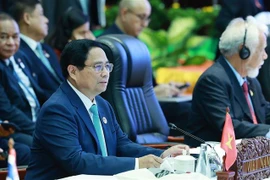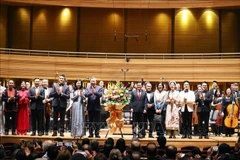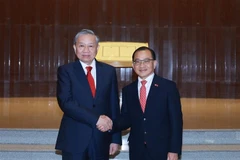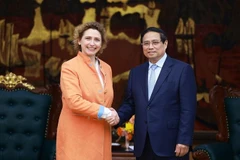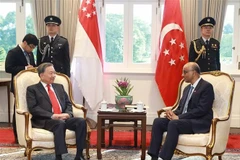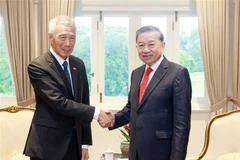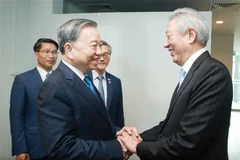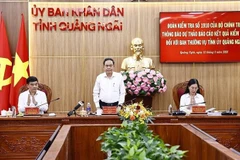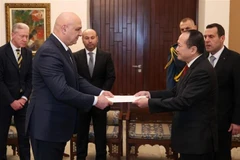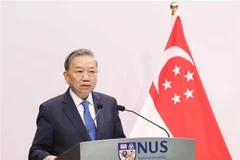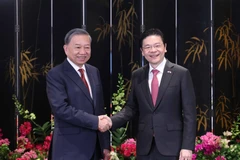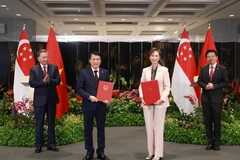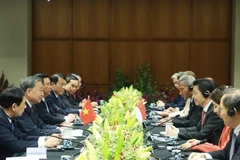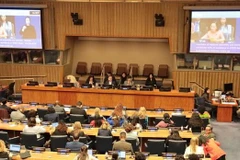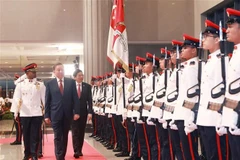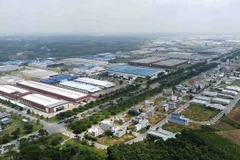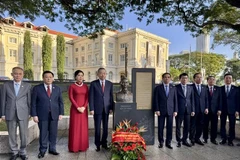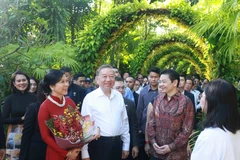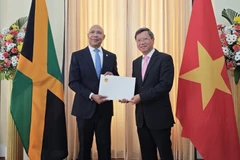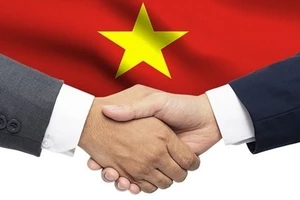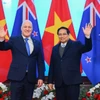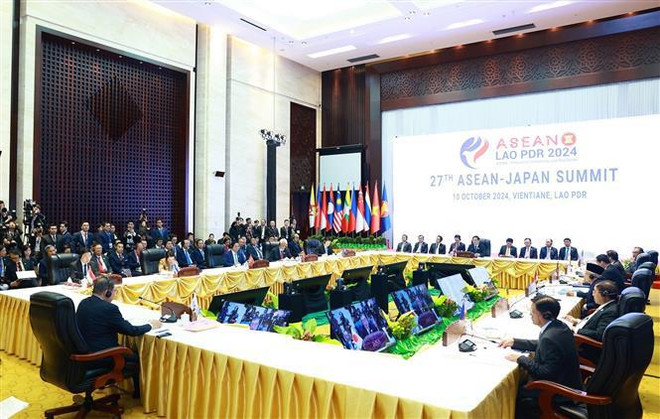
Vientiane (VNA) – Prime Minister Pham Minh Chinh led a Vietnamese delegation to attend the ASEAN - Japan, ASEAN Plus Three (China, the Republic of Korea, Japan), and ASEAN - Australia Summits in Vientiane, Laos, on October 10.
At the 27th ASEAN-Japan Summit, PM Chinh applauded the success of the commemorative summit marking the 50th anniversary of the ASEAN-Japan relations in December 2023, which he described as a historic milestone heralding a new era of the bilateral cooperation.
He stressed that economic, trade, and investment cooperation should remain the key impetus while the connectivity of the two sides’ economies should be enhanced.
PM Chinh encouraged Japanese businesses to invest more in ASEAN and called on the Northeast Asian nation to increase assistance for ASEAN firms to engage in its businesses’ supply chains, develop supporting industries, and nurture skilled workforces.
Besides, the Vietnamese PM said, it is necessary to promote new growth drivers which are emerging areas such as digital transformation, semiconductors, cloud computing, Internet of Things, energy transition, green economy, circular economy, and smart agriculture.
To create a future of resilient and sustainable development and boost response to climate change and disasters, PM Chinh suggested Japan continue cooperating with and assisting ASEAN and Mekong sub-region countries to cope with climate change, step up energy transition, and realise the commitment to greenhouse gas emissions reduction, including via the Asia Zero Emission Community.
He perceived that the two sides should strengthen strategic coordination for regional peace, security, and stability. Given this, he asked Japan to continue supporting ASEAN’s common stance on the East Sea issue, which is to peacefully resolve disputes, strive to finalise a practical and effective Code of Conduct (COC) in the East Sea in line with international law, especially the 1982 United Nations Convention on the Law of the Sea (UNCLOS), and work towards building the East Sea into a sea of peace, stability, cooperation, and sustainable development.
At the summit, participating leaders pledged to keep working closely to implement the commitments, initiatives, and outcomes of the commemorative summit, including the joint vision statement and its implementation plan.
In particular, ASEAN and Japan will push ahead with collaboration in economy, trade, investment, supply chain consolidation, infrastructure connectivity, national defence, maritime security, transnational crime combat, cybersecurity, along with natural disaster management and response. They will also give high priority to the cooperation in science - technology, innovation, artificial intelligence, digital transformation, green infrastructure, e-vehicle ecosystem, energy, climate change response, people-to-people exchanges, and tourism.
Stressing the importance of the ASEAN-Japan comprehensive strategic partnership, Japanese PM Ishiba Shigeru affirmed his country’s commitment to continue enhancing cooperation with and support for the bloc to building an ASEAN Community of solidarity, stronger connectivity, and narrowed development gap.
Addressing the 27th ASEAN Plus Three Summit, PM Chinh spoke highly of the roles of China, Japan, and the Republic of Korea (RoK) in maintaining stability, peace, cooperation and development in the region, affirming that the prosperous development of ASEAN cannot be achieved without the connection, cooperation and support of its Plus Three partners in the past, at present and in the future.
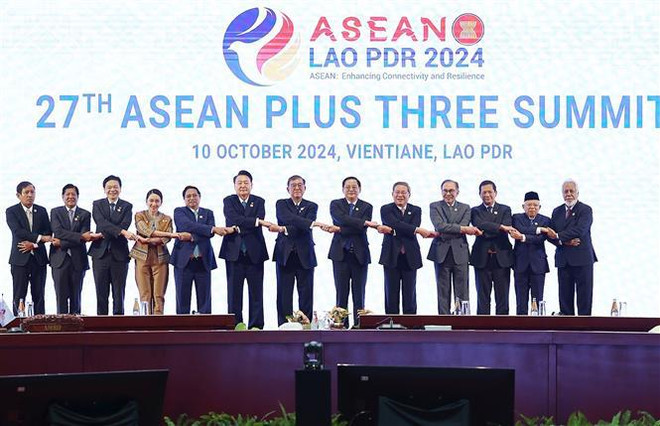
Amid the complicated and uncertain developments in the regional and world situation, PM Chinh outlined three key orientations for ASEAN Plus Three cooperation, including ensuring the connectivity of supply chains; leveraging new growth drivers like innovation, digital transformation, green transition, circular economy, sharing economy, and emerging sectors like artificial intelligence, semiconductor, cloud computing, and Internet of Things; and enhancing resilience against natural disasters and climate change.
He underscored the importance of a peaceful, secure, and stable environment free from war, which is conducive to development for nations and the entire region, including Southeast Asia and Northeast Asia, adding that in resolving any issue, the most critical factor is to respect international law, the United Nations Charter, and the 1982 UNCLOS.
Calling for candid dialogue, sincere cooperation, mutual trust and respect and peaceful settlement of disputes, the PM urged collective efforts to address global challenges and jointly shape up an open, inclusive, and transparent regional structure that heightens international law, with ASEAN playing a central role and effective cooperation and assistance from China, Japan, and the RoK.
At the 4th ASEAN-Australia Summit, participating leaders praised the success of a special summit held in March to commemorate the 50th anniversary of the two sides’ relations. They highlighted a need for sustained close collaboration to implement its outcomes, thus advancing the ASEAN - Australia comprehensive strategic partnership in a practical, effective, and mutually beneficial manner.
Welcoming the recent progress, particularly their bilateral trade of 94.4 billion USD and Australia’s direct investment of 1.6 billion USD channelled into ASEAN last year, the leaders agreed to jointly implement a newly adopted action plan for 2025-2029 based on their Leaders' Vision Statement and the Melbourne Declaration, established during the special summit.
The two sides also pledged to cooperate on commitments and initiatives, including the flagship Australia for ASEAN Futures initiative, which is valued at 204 million AUD (137 million USD), and a 2 billion AUD investment financing facility to boost investment in Southeast Asia.
Australian PM Anthony Albanese underscored the significance of the special summit, which set the course for future cooperation between the bloc and Australia for the coming decades. He also affirmed Australia’s commitment to close and mutually beneficial collaboration with the regional nations to address challenges and seize opportunities, contributing to a more inter-connected and resilient region as well as shared peace, security, stability, and prosperity.
In his remarks, PM Chinh called on ASEAN and Australia to continue working closely to build their future-oriented comprehensive strategic partnership for peace and prosperity.
Commending the long-standing ties with Australia – a sincere friend and trustworthy partner who is always willing to offer support during times of difficulty, he recommended enhancing strategic bilateral coordination for regional peace and stability.
The Vietnamese leader also praised Australia’s active support for ASEAN’s common stance on the East Sea, which is to peacefully resolve disputes and strive to complete an effective and substantive COC that matches international law, particularly the 1982 UNCLOS, thereby helping build the sea into an area of peace, stability, cooperation, and sustainable development.
The PM underscored the need for both sides to coordinate with each other to create breakthroughs in economic, trade, and investment cooperation, and strongly promote new growth drivers such as science and technology, innovation, and digital transformation.Accordingly, the two sides need to capitalise on the complementary economic strengths, increase support for businesses, and facilitate greater market access, especially for agricultural products while encouraging the diversification of supply chains.
Looking to the future of inclusive and sustainable development for all nations and their people, PM Chinh called on ASEAN and Australia to mutually support each another in successfully realising the sustainable development goals by expanding their cooperation in areas such as energy transition, green transition, environmental protection, emissions reduction, and climate change response.
The PM welcomed Australia's support for the development of the Mekong subregion. He also thanked Australia for its prioritised assistance to Vietnam's Mekong Delta, particularly in its "nature-based" development and climate change adaptation.
Furthermore, he also proposed enhancing people-to-people exchanges, as well as strengthening cooperation in education and training, hoping that Australia would increase scholarships for students from ASEAN countries, contributing to high-quality human resources development./.
